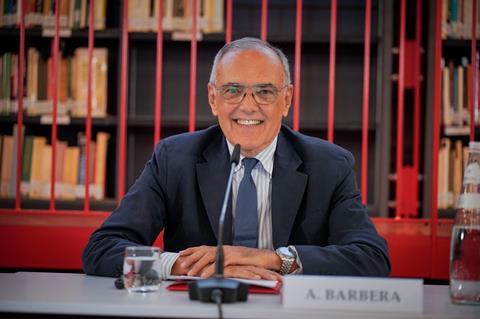
Funding for the next edition of Biennale College Cinema, Venice Film Festival’s emerging filmmakers’ training and production initiative, will be hiked from €150,000 to €200,000 per project.
The increase comes off the back of a three-year sponsorship deal with French media giant Vivendi that was announced in July. “Vivendi will join us as our partner,” said Venice festival artistic director Alberto Barbera. “We believe this will have a significant impact on our projects in coming years.”
Financial details of the partnership were not revealed. Biennale College Cinema is also supported by Italy’s ministry of culture, and has ongoing collaborations with the Gotham Film and Media Institute in New York and the TorinoFilmLab.
Biennale College Cinema organisers also unveiled the 12 new projects, including ones from Afghanistan, Mexico, Italy, Georgia and Iran, selected for the upcoming 11th edition of the programme.
The 12 selected filmmakers will travel to Venice in October to hold their first residencies with Biennale College tutors from all over the world. During the residency, the four projects to receive the €200,000 production funding will also be selected.
Filmmakers receive marketing as well as production support. By the time they arrive to screen their completed features in Venice, they are usually in contact with sales agents and have their marketing material ready. The festival does not ask for any rights in the films it backs.
In the 10 years since Barbera and Paolo Baratta, then-president of the Venice Biennale, launched the Biennale College initiative, it has grown from a small start-up to a powerful programme which has produced a wide variety of films.
“The past 10 years have been characterised by hard work, curating, passion and have led to the creation of a community of emerging producers and directors across all continents,” said Savina Nerotti, Biennale College Cinema’s head of programming. “This decade has resulted in 60 feature films and 21 virtual reality productions.”
Of these, half were produced with Biennale College funding and half with independent financing.
Past low-budget features directed by Biennale College alumni have won prizes at festivals from Rotterdam to Sundance and enjoyed wide-scale distribution around the world.
The four Biennale College films greenlit last year and screening at this year’s festival are: A Family Fixed With Gold from Italian director Monica Dugo and producer Cinzia Rutson; Banu from Azerbaijan director Tahmina Rafaella and Iranian producer Katayoon Shahabi; Kazakh production Mountain Onion directed by Eldar Shibanov and produced by Yuliya Levitskaya; and Palimpsest from Finnish director Hanna Västinsalo and US producer Cyril Abraham.
The 12 selected projects:
Arms Of A Man (Ind-UK)
Dir. Rohan Kanawade; prod. Neeraj Churi
Árni (Hun)
Dir. Dorka Vermes; prod. Balázs Zachar
Behind The Garden (It)
Dir. Cecilia Albertini; prod. Irene Santoro
The Cave Without A Name (US)
Dir. Jessica Bardsley; prod. Caitlin Mae Burke
Chaos Of Silence (Geo)
Dir. Nino Shaburishvili; prod. Tinatin Kajrishvili
Fire Dreaming (Mex)
Dir. José Pablo Escamilla; prod. Diandra Arriaga
The Good Deed (Arm)
Dir. Ophelia Harutyunyan; prod. Nara Leone Ter-Gabrielyan
Honeymoon (Afgh-Slo)
Dir. Sahraa Karimi; prod. Wanda Adamik Hrycova
I Would Like To See Your Private Photos (Braz)
Dir. Marcelo Grabowsky; prod. Mariana Ferraz
Mammad (Iran-Fr)
Dir. Saleh Kashefi; prod. Thomas Jacquey
Raffaella 2000 (It)
Dir. Andre Lucini; prod. Désirée Manetti
To See These Days (It)
Dir. Federico Lodoli, Carlo Gabriele Tribbioli; prod. Giacomo Lamborizio

























No comments yet